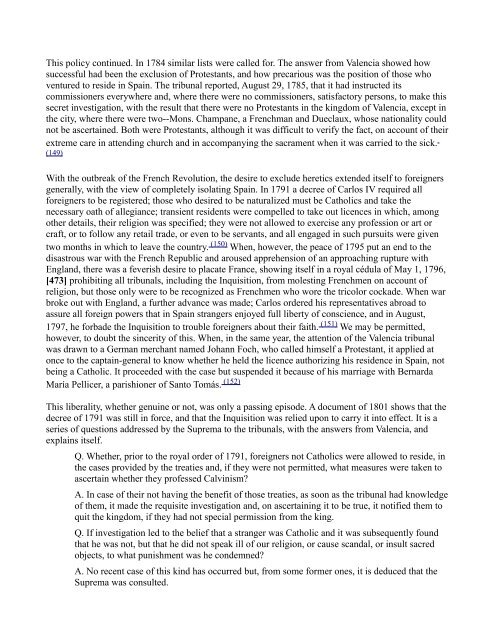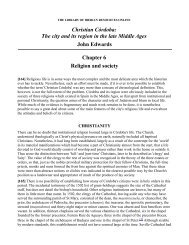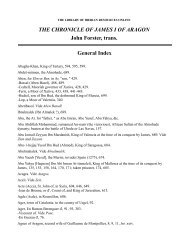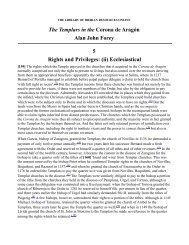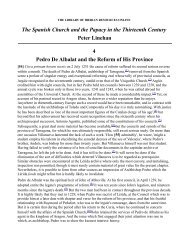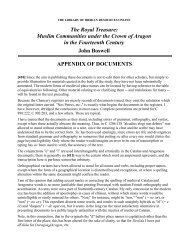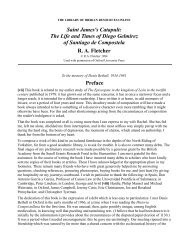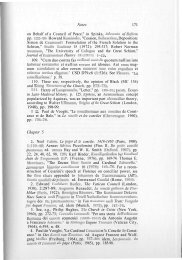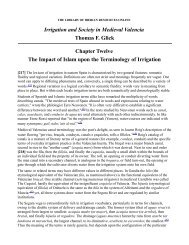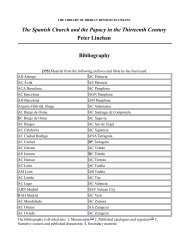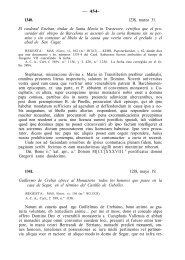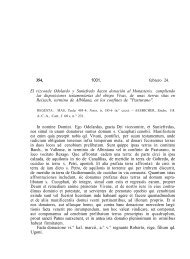PROTESTANTISM - The Library of Iberian Resources Online
PROTESTANTISM - The Library of Iberian Resources Online
PROTESTANTISM - The Library of Iberian Resources Online
You also want an ePaper? Increase the reach of your titles
YUMPU automatically turns print PDFs into web optimized ePapers that Google loves.
This policy continued. In 1784 similar lists were called for. <strong>The</strong> answer from Valencia showed how<br />
successful had been the exclusion <strong>of</strong> Protestants, and how precarious was the position <strong>of</strong> those who<br />
ventured to reside in Spain. <strong>The</strong> tribunal reported, August 29, 1785, that it had instructed its<br />
commissioners everywhere and, where there were no commissioners, satisfactory persons, to make this<br />
secret investigation, with the result that there were no Protestants in the kingdom <strong>of</strong> Valencia, except in<br />
the city, where there were two--Mons. Champane, a Frenchman and Dueclaux, whose nationality could<br />
not be ascertained. Both were Protestants, although it was difficult to verify the fact, on account <strong>of</strong> their<br />
extreme care in attending church and in accompanying the sacrament when it was carried to the sick.<br />
(149)<br />
With the outbreak <strong>of</strong> the French Revolution, the desire to exclude heretics extended itself to foreigners<br />
generally, with the view <strong>of</strong> completely isolating Spain. In 1791 a decree <strong>of</strong> Carlos IV required all<br />
foreigners to be registered; those who desired to be naturalized must be Catholics and take the<br />
necessary oath <strong>of</strong> allegiance; transient residents were compelled to take out licences in which, among<br />
other details, their religion was specified; they were not allowed to exercise any pr<strong>of</strong>ession or art or<br />
craft, or to follow any retail trade, or even to be servants, and all engaged in such pursuits were given<br />
two months in which to leave the country. (150) When, however, the peace <strong>of</strong> 1795 put an end to the<br />
disastrous war with the French Republic and aroused apprehension <strong>of</strong> an approaching rupture with<br />
England, there was a feverish desire to placate France, showing itself in a royal cédula <strong>of</strong> May 1, 1796,<br />
[473] prohibiting all tribunals, including the Inquisition, from molesting Frenchmen on account <strong>of</strong><br />
religion, but those only were to be recognized as Frenchmen who wore the tricolor cockade. When war<br />
broke out with England, a further advance was made; Carlos ordered his representatives abroad to<br />
assure all foreign powers that in Spain strangers enjoyed full liberty <strong>of</strong> conscience, and in August,<br />
1797, he forbade the Inquisition to trouble foreigners about their faith. (151) We may be permitted,<br />
however, to doubt the sincerity <strong>of</strong> this. When, in the same year, the attention <strong>of</strong> the Valencia tribunal<br />
was drawn to a German merchant named Johann Foch, who called himself a Protestant, it applied at<br />
once to the captain-general to know whether he held the licence authorizing his residence in Spain, not<br />
being a Catholic. It proceeded with the case but suspended it because <strong>of</strong> his marriage with Bernarda<br />
María Pellicer, a parishioner <strong>of</strong> Santo Tomás. (152)<br />
This liberality, whether genuine or not, was only a passing episode. A document <strong>of</strong> 1801 shows that the<br />
decree <strong>of</strong> 1791 was still in force, and that the Inquisition was relied upon to carry it into effect. It is a<br />
series <strong>of</strong> questions addressed by the Suprema to the tribunals, with the answers from Valencia, and<br />
explains itself.<br />
Q. Whether, prior to the royal order <strong>of</strong> 1791, foreigners not Catholics were allowed to reside, in<br />
the cases provided by the treaties and, if they were not permitted, what measures were taken to<br />
ascertain whether they pr<strong>of</strong>essed Calvinism?<br />
A. In case <strong>of</strong> their not having the benefit <strong>of</strong> those treaties, as soon as the tribunal had knowledge<br />
<strong>of</strong> them, it made the requisite investigation and, on ascertaining it to be true, it notified them to<br />
quit the kingdom, if they had not special permission from the king.<br />
Q. If investigation led to the belief that a stranger was Catholic and it was subsequently found<br />
that he was not, but that he did not speak ill <strong>of</strong> our religion, or cause scandal, or insult sacred<br />
objects, to what punishment was he condemned?<br />
A. No recent case <strong>of</strong> this kind has occurred but, from some former ones, it is deduced that the<br />
Suprema was consulted.


